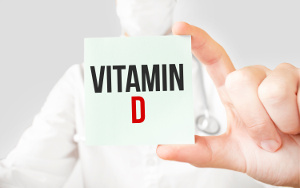Supplementation with vitamin D can mitigate and prevent depression
 Several studies have shown a direct link between depression and lack of vitamin D, both of which are common problems. Vitamin D has numerous functions in the brain and nervous system and it helps counteract local inflammation that is often seen in connection with depression. According to a new Finish meta-analysis, high-dosed vitamin D supplementation can even ameliorate symptoms of depression. The question is how to optimize blood levels of the nutrient in order to prevent the disease.
Several studies have shown a direct link between depression and lack of vitamin D, both of which are common problems. Vitamin D has numerous functions in the brain and nervous system and it helps counteract local inflammation that is often seen in connection with depression. According to a new Finish meta-analysis, high-dosed vitamin D supplementation can even ameliorate symptoms of depression. The question is how to optimize blood levels of the nutrient in order to prevent the disease.
It is only natural for our mood to vary, and there are times where we feel down in the dumps. Depression, however, is a morbid condition characterized by a constant feeling of being depressed, showing lack of interest, and, in many cases, feeling hopelessly tired. Even bright and positive memories of the past may become engulfed by darkness. Also, problems like low self-esteem, a feeling of guilt, difficulty with concentrating, anxiety, and sleep disturbances may occur. With mild and moderate depression, talk therapy is rather common. In more severe cases, however, talk therapy is often combined with the use of anti-depressive medication. In very serious cases, electroshock therapy may be necessary.
Unfortunately, many people with depression end up getting into therapy too late. Also, anti-depressive medication often turns out to be insufficient and may even come with serious side effects. New strategies for prevention and treatment are needed, and diet appears to play a major role. There is also increasing focus on vitamin D, which we humans primarily get from sun exposure during the summer. Around one billion people worldwide are believed to lack vitamin D because of getting too little sun during the winter, spending too much time indoors, plus factors such as ageing, being dark-skinned, and having type 2 diabetes and other chronic diseases. It is therefore especially important to prevent and treat vitamin D deficiency if this is a contributing factor with depression.
Vitamin D and its role in our brain and mood
Most cells and tissues in our body, the brain included, have vitamin D receptors (VDR) that regulate different genes by way of on-off switches. This is of vital importance to the brain’s neurons and other cells so they can carry out their many tasks. Vitamin D also regulates neurotransmitters such as serotonin and dopamine that are important for our mood. In addition, vitamin D inhibits several pro-inflammatory cytokines that are involved in depression.
Multiple studies have already shown a link between vitamin D deficiency and depressive symptoms. Still, a previous meta-analysis showed conflicting results with regard to vitamin D supplementation and its effect on depression. This may be because the vitamin D supplements were given to people who were not deficient in the nutrient in the first place. It may also be because they did not take the supplement for very long or because the dose was too low to optimize levels of vitamin D in their blood. The quality of the supplements is also vital for a person’s ability to absorb and utilize the nutrient.
High-dosed vitamin D has a positive effect on depression
The new meta-analysis from University of Eastern Finland is currently the largest study to look at the effect of vitamin D on depressive symptoms. The analysis includes the results from 41 placebo-controlled studies around the world. The studies include patients from the general public who suffer from depression but also includes patients who suffer from physical diseases, as well. The scientists found that high-dosed vitamin D supplements effectively mitigate symptoms of depression when compared to placebo.
The doses used in the studies were typically between 50-100 micrograms of vitamin D daily, which is far more than the official recommendations (5-20 micrograms).
The researchers believe that their new discovery may encourage science to conduct more clinical studies to see how even greater doses of vitamin D may affect people with depression.
The meta-analysis is published in Critical Reviews in Food Science and Nutrition and is made in an international collaboration with Finish, Australian, and American scientists.
It is also relevant to look closer at how vitamin D supplements prevent depression, including winter depression, especially because vitamin D deficiencies are most common during the cold months. In any case, it is important to have optimal blood levels of vitamin D. The lower threshold level is 50 nmol/L but many experts believe that levels between 75-120 nmol/L are better for optimal disease prevention.
References:
Tuomas Mikola, et al. The effect of vitamin D supplementation on depressive symptoms in adults: A systematic review and meta‐analysis of randomized controlled trials. Critical Reviews in Food Science and Nutrition, 2022.
University of Eastern Finland. Vitamin D supplementation seems to alleviate depressive symptoms in adults. ScienceDaily. August 12, 2022
Edward Bullmore. The Inflamed Mind. London Short Books 2018
Chieh-Hsin Lee and Fabrizio Giuliani. The Role of Inflammation in Depression and Fatigue. Frontiers in Immunology. 2019
Search for more information...
- Created on .








